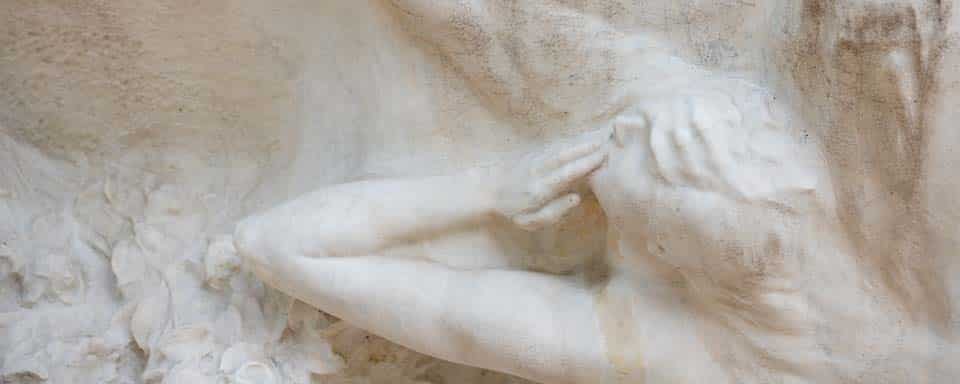The Catholic Church asserts the existence of a purification stage called purgatory, that takes place before entering in the beatific joy of Heaven. A lot of people are doubtful about it, yet people have always felt the need to pray for their dead. When was this truth of faith introduced? Why is purgatory good news? Will we all go to purgatory?
“All who die in God’s grace and friendship, but still imperfectly purified, are indeed assured of their eternal salvation; but after death they undergo purification, so as to achieve the holiness necessary to enter the joy of heaven.” Catechism of the Catholic Church, 1030.
The purgatory, put to the question
The purgatory chronicle is not an obvious one. A few historians say it vanished in the 20th century. While others maintain that it was contrived in the Middle Ages. Some people deny its being mandatory, arguing that God doesn’t need it in order to remodel us. They make reference to the example of the Penitent Thief, one of the two criminals crucified with Jesus, who entered heaven immediately after death. The criminal recognized that his punishment was fair and, out of love for Go, he sincerely regretted his sins and was changed in a minute moment by the Holy Spirit. Thus demonstrating that purgatory is therefore not an absolute essential. For this reason, some people do find it hard to acknowledge it.
On the other hand, as for Protestantism, grace doesn’t transform us from within, but rather covers us, and it is Jesus who is judged in our place. Under such conditions, no need for purification, as we will be saved no matter what. Among Orthodox Christians, the word purgatory is not used, but they pray for the dead and offer Mass for the dead.
Purgatory gets bad press in the West, particularly in France. Perhaps this is due to the spiritualism and romanticism prevailing then in the 19th century. However, everywhere else in the world, Catholics continue to contentedly believe in praying for the souls in purgatory, this is particularly so in Africa, Asia and America. People have always prayed for the departed, as if they had a profound intuition that they could still do something for the dead. The Catholic Church has always been prayed for the dead; every day we pray for them during Mass.
When did purgatory appeared?
Purgatory was formally accepted in Church theology at the Council of Florence in 1439. However the truth implied by this identification had been credited for ever since the very early Christian age. Indeed, the Second Book of the Martyrs of Israel reveals that the Jews themselves, three centuries before Christ, prayed for the dead because they believed in the resurrection of the flesh and the forgiveness of sins after death.
The New Testament also provides examples that assert to it. Saint Paul went on reminding that: “for no one can lay a foundation other than the one that is there, namely, Jesus Christ. If anyone builds on this foundation with gold, silver, precious stones, wood, hay, or straw,
the work of each will come to light, for the Day will disclose it. It will be revealed with fire, and the fire [itself] will test the quality of each one’s work.
If the work stands that someone built upon the foundation, that person will receive a wage.
But if someone’s work is burned up, that one will suffer loss; the person will be saved,* but only as through fire.” (1 Cor 3, 11-15). The Apostle thus shows the existence of salvation “as through fire.”
“Purgatory: God’s emergency rooms.”
Saint Curé of Ars
Purgatory is good news
Purgatory is good news because, during this measure of mercy, God’s love prepares us, transforms us and purifies us from the consequences of our sins. It’s like a detoxification cure that frees us from all our wrong attachments, allowing us to love fully and enabling us to receive God’s love in glory.
Purgatory is also good news, because justice is fulfilled. That means that the order I have wounded by my sin is restored. This doesn’t happen externally, but within me, transforming and purifying me.
Souls in purgatory experience both at the same time an immense joy : that of knowing they have been saved, and know they’re going to taste the joy of heaven; the joy of already being in God’s love and grace; the joy of already belonging to the communion of the Church. And then there’s the anguish of not yet tasting the joy of heaven. Here on earth, it’s a bit like a fiancée impatiently awaiting the return of her fiancé further to a long separation. She can more or less occupy her time, with such or such activity, reading a book or on her smartphone… None of this in purgatory, nothing but the increasingly burning desire for the end of convalescence.
In purgatory, there’s nothing to do but wait. As great mystics like Saint Catherine of Genoa pointed out, it’s altogether an immense joy and an immense suffering, the likes of which we can never experience here on earth.
Is purgatory a place or a state?
Is purgatory a place or a state? It’s not a place, because after death, the soul is separated from the body, and location relates to physical bodies. First and foremost it is a state of transformation during which time is not the cosmological time as we know it but psychological time. As we all know, in our maturation and growth, the notion of time is not the same for all and is unique to each individual.
But above all, purgatory is a relationship, because the Christian faith comprehends everything as a relation to love and to the one who is Love: Christ Himself. From this stand-point, to reject Christ is hell, and o the contrary, total openness to Christ’s love is heaven. Yet in this love relation to God, there may remain things from which we need to be purified in order to be fully in Christ: this is what purgatory is. So purgatory is a relationship with Christ altogether as a relationship of love, justice and mercy, and thus, a purifying relationship.

Shall we all go to purgatory?
Purgatory can already be experienced here on earth, for example, when you are ill or undergoing trials, providing you are willing to surrender yourself to love, rather than cowering in on oneself and refusing Christ’s love. Some purification can already take place here below and, for those who shall need it, purgatory subsequently to death will complete the work of opening up to God’s love. Purgatory is not compulsory, and Saint Theresa tells us that we ought to aspire to go to heaven straight on. Purgatory is a gift from God to help us go to him. He could, of course, bring us directly to heaven without going through purgatory, as this is the for some. However for most of us, we shall desire to satisfy God’s justice after we pass away. It is the soul itself,” writes Saint Catherine of Genoa in her Treatise on Purgatory, “which, not feeling ready, chooses of its own accord to be purified before communing with love”.
Purgatory, a time to learn about love
Purgatory is a time to learn about love, a time to detach oneself from oneself and turn to God.
Entrust a beloved departed to the prayer of the Fraternity of Montligeon:
Can we help the deceased?
Should they be in Heaven, they will be the ones praying for us; should they be in Hell, they reject our love, therefore our praying for them is useless. On the other hand, if they are undergoing purgatory, our prayers do make sense. The living can always do something for their deceased: it’s never too late and never useless. By means of prayers, fasting, almsgiving, thanksgiving, asking for and offering forgiveness, one can help them in their purification stage. Prayers and intercessions, however poor they may be, help them a great deal at this stage, as attested by Saint Teresa of Avila, Saint Faustina or Saint Pio of Pietrelcina (Padre Pio). For their part, souls in purgatory are not ungrateful: “because it is a holy and a wholesome thought to pray for the dead that they may be loosed from their sins’ she offers her suffrages for them. Our prayer for them is capable not only of helping them, but also of making their intercession for us effective. ” Catechism of the Catholic Church n°958.
People think they can no longer ask for forgiveness or give thanks to their deceased. Yet it is never too late for, in the communion of saints, by entrusting those we love to the Lord through the intercession of the Virgin Mary, we can still do good to our deceased.
“Do not weep, for I shall be more useful to you after my death and I shall help you then more effectively than during my life ” stated St. Dominic to his brothers, Jourdain de Saxe, lib. 93. (Quoted in the Catechism of the Catholic Church, no. 956.)
Saint Augustine thus recounted the last words of his mother Monica as she was dying: “Then, seeing us overwhelmed with sadness, she said: ‘You will bury your mother here.’ I was silent, holding back my tears. As for my brother, he said a few words to her: that she should not wish to die abroad but, as a happier fate, in her homeland. On hearing this, my mother’s face grew anxious and she looked at him reproachfully for such a thought. Then she looked at me: ‘See what he says?’ And, addressing both of us: ‘Bury my body anywhere; let it give you no cause for concern. All I ask is that you remember me at the altar of the Lord, wherever you may be. Then, having said so, she remained silent, for the illness was getting worse and making her suffer.” Confessions, Saint Augustine, BA 14 IX, XI, 27.

